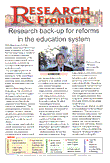 |
| Earmarked Research Grants 2001-2002 | ||
| Discipline |
Applications
|
Requested
Funding
(HK$ m) |
| Engineering | 573 | 504.2 |
| Physical Sciences | 217 | 198.6 |
| Biology & Medicine | 425 | 496.6 |
| Humanities, Social Sciences & Business Studies | 415 | 301.5 |
| Total | 1,630 | 1,500.9 |
| Source: RGC |
Available
funding: HK$390.7
|
|
Does the RGC give equal emphasis to both basic and applied research?
The RGC does not distinguish between basic and applied research, as long as the research meets its quality threshold. The RGC strongly believes that basic research is important and provides a foundation and catalyst for applied research. Applied research, on the other hand, is important for building a good research culture and attracts RGC support as long as it has scientific merit and is of quality.
How much emphasis does the RGC give to research with a local relevance?
The RGC supports quality research on a broad front and, as one selection criteria, it takes into account the potential for social, cultural and economic applications. Research which is relevant to Hong Kong's needs is encouraged. To date, the RGC has supported many projects which have resulted in significant benefits for the local community.
How important to RGC is product development and prototyping?
As a funding body under the education umbrella, support in this area is selective, and concentrates on projects with academic merit. The RGC believes that, primarily, funding for product development and prototyping should be the task of the private sector, of non-university R&D organisations and of funding bodies such as the Innovation and Technology Fund.
To what extent does the RGC support research in priority areas identified by the Government?
The RGC's budget, which comes wholly from the Government's education vote, is intended to be spent on supporting activities which help extend capacity in the higher education sector. If the Government has a priority area, any required research maybe more appropriately funded under a different budget from dedicated agencies like the Innovation and Technology Commission.
In the light of the Government's current education reforms, will the RGC be supporting action research to help shape Government policy on the subject?
As a funding agency under the education umbrella, the RGC naturally focuses on education and training as one of its priorities. As long as the research is academically sound, the RGC will consider funding. In the current triennium, the RGC has supported a total of 23 projects in the area of education for total funding of about HK$16.5 million. Apart from RGC funding, institutions have also received considerable sums of money from the Quality Education Fund to undertake service-oriented education research.
What is the RGC's view of research involving interdisciplinary and/or inter-institutional collaboration?
We strongly encourage such collaboration as it provides opportunities for cross-fertilisation and the sharing of expertise. Central Allocation Funding, one of the four broad categories of Earmarked Research Grant funding, was introduced to foster this kind of collaboration, particularly where disciplines are traditionally unrelated to each other. For example, one current project on environmental protection policy involves three disciplines; Humanities and Social Sciences, Science, and Law to address ethical, social, scientific and legal dimensions of the issue. Out of the six group research projects supported in the recent Central Allocation Scheme exercise, five involve cross-institution collaboration covering a range of disciplines.